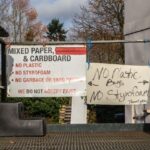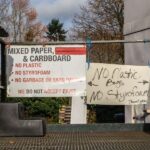BY JONATHAN FROCHTZWAJG
For Far West Fibers, one of Oregon’s largest and oldest mixed-recycling companies, garbage alchemy has long been big business.
BY JONATHAN FROCHTZWAJG | PHOTOS BY JASON KAPLAN
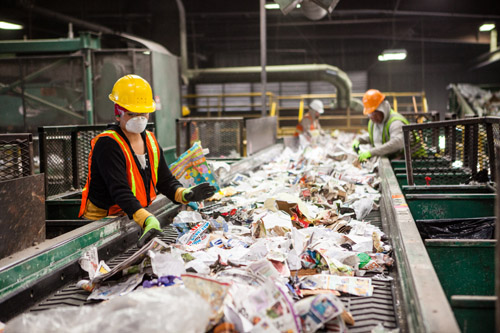 Far West Fibers
Far West Fibers
President & CEO: Keith Ristau
Founded: 1980
Number of Employees: 150-160
Factoid: Far West receives 180 pounds of dirty diapers per shift
Standing atop a multimillion-dollar sorting apparatus at his company’s cavernous Northeast Portland processing facility, Keith Ristau, president and CEO of Far West Fibers, surveys malodorous mountains of cardboard boxes and milk jugs. Over the facility’s nearly round-the-clock operating hours, some 50 employees will sort through these heaps, turning one man’s trash into another’s treasure. It’s a dirty, labor-intensive job — “you have to have a lot of what we call ‘10-finger technology,’” jokes Ristau — but when there’s profit to be made, somebody’s going to do it.
For Far West, one of Oregon’s largest and oldest mixed-recycling companies, garbage alchemy has long been big business. Founded in 1980 — before curbside recycling was introduced in Oregon — the recycler today employs more than 150 people who work in six facilities spread across the Portland area. The company handles approximately 180,000 tons of material per year, including almost three quarters of the City of Portland’s recyclables, according to Ristau. But since the recession — and especially since 2011, when the city made an unintentionally harmful change to its curbside-collection service — the company has seen revenues slip about 15%. Now, fittingly enough, this recycler must salvage a new material: itself.
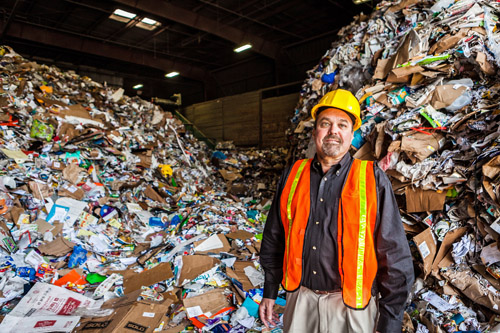 In his office at the Northeast Portland sorting center, Ristau, a goateed 55-year-old, explains the twofold problem. First, commodity prices — in particular, the price of paper — have been falling. Ristau estimates that the value of mixed scrap paper, which makes up the largest share of the company’s sales, has decreased roughly 15% since 2008, as a slowing in shipping activity and the decline of print newspapers has brought down demand. The problem was compounded locally by the closures of Oregon City’s Blue Heron Paper Co. in 2009 and the Albany area’s International Paper Co. mill in 2011.
In his office at the Northeast Portland sorting center, Ristau, a goateed 55-year-old, explains the twofold problem. First, commodity prices — in particular, the price of paper — have been falling. Ristau estimates that the value of mixed scrap paper, which makes up the largest share of the company’s sales, has decreased roughly 15% since 2008, as a slowing in shipping activity and the decline of print newspapers has brought down demand. The problem was compounded locally by the closures of Oregon City’s Blue Heron Paper Co. in 2009 and the Albany area’s International Paper Co. mill in 2011.
At the same time, “contamination” of the material Far West receives — that is, the commingling of trash with recyclables — has dramatically increased, bringing with it a corresponding increase in the company’s processing costs. Contamination is a longstanding, industry-wide problem, with rates more or less tracking with recycling rates since the early ‘90s. The issue is so pervasive that last year, China, which dominates the recycling market, erected a “Green Fence” — a stricter inspections regime — at its ports to prevent contaminated American recyclables from ending up in Chinese landfills.
The contamination rate in Portland, however, has risen especially precipitously as of two and a half years ago, when the city switched the frequency of garbage collection from weekly to every other week as part of its rollout of curbside composting. Having their trash picked up less often, Ristau claims, caused some Portlanders to simply put their garbage into their recycling bins, since those are still collected every week. The amount of nonrecyclable material Far West received doubled in the first month after the switch.
“Changing that program immediately changed our whole business,” says Ristau, who started at Far West as a manager-trainee more than two decades ago and today co-owns the business with six other managers.
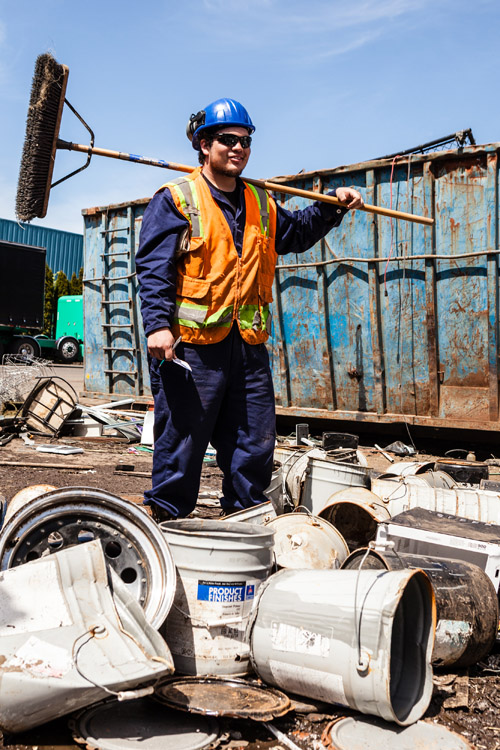 In Portland Far West’s competitive advantage is an old-school one: strong, long-term relationships. The fact that it’s been in the area longer than other mixed-material recyclers has enabled the company to forge bonds with — and thus get better prices from — material buyers such as the International Paper Co. in Springfield, says Ristau. “We all talk to the same guys, but it comes down to relationships,” he observes.
In Portland Far West’s competitive advantage is an old-school one: strong, long-term relationships. The fact that it’s been in the area longer than other mixed-material recyclers has enabled the company to forge bonds with — and thus get better prices from — material buyers such as the International Paper Co. in Springfield, says Ristau. “We all talk to the same guys, but it comes down to relationships,” he observes.
But if contamination continues to muck up the business, relationships may not be enough. The local market has never been flexible enough to accommodate significant change. Because Oregon was an early adopter of recycling, the state is now the most competitive recyclables market in the country, with the three mixed-material sorting centers owned by Far West jostling four owned by competitors such as SP Recycling and K.B. Recycling.
Far West is working with the city and the various haulers to curb contamination by holding residents more accountable for putting garbage in their recycling. Metro, meanwhile, has convened a group of more than 50 stakeholders — including representatives of local governments, haulers and recycling companies — to come up with a solution to the problem. The Oregon Department of Environmental Quality is also studying the issue, and Ristau says there’s a possibility the state will provide recycling companies a subsidy to purchase the costly equipment needed to process the “dirtier” shipments their facilities are receiving.
Even with a subsidy, though, recyclers such as Far West aren’t convinced that it makes financial sense to sort out all of this trash. “You’re getting something out which you have to pay to get rid of,” Ristau notes, referring to the cost of dumping garbage at landfills. Indeed, with the price of their products — such as paper — going down and the cost of their production going up, these companies aren’t sure the mixed-recycling business itself pencils out anymore.
“It’s gotten to be unprofitable to sort through curbside recycling,” Ristau says.
Far West’s solution, and the solution of many recyclers, has been to get out of mixed recycling as much as possible — and to diversify. In 2000, before plastic and metal became part of the mix, paper sales comprised 98% of the company’s business; today that figure is 51%.
“We’re trying to grow our metals business. We’re getting into plastics more. We just started a Styrofoam program,” Ristau says. Far West sources these materials, which can’t be recycled at the curb, from recycling depots and metal buy-back centers throughout the metro area. “We’re not jumping ship completely,” says Ristau. “But we’re trying to get our hands in more things.”
Despite the obstacles, if any business should be able to remake itself in a new, more diversified image, it’s a recycler. Back in Ristau’s office, the CEO points out items that were likely manufactured from recycled materials. He raps a picture frame: reclaimed plastic. Toes the carpet: plastic fibers from milk jugs, believe it or not. Through the eyes of a recycling executive, the world is full of things that can be made anew. Why not one’s own company?


